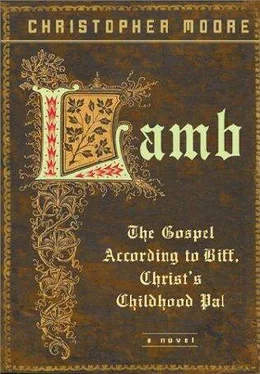We found a wide-beamed, raised-stern Roman cargo ship bound for Tarsus that would stop at all the ports along the way, including Selucia. The ship’s master was a wiry, hatchet-faced Phoenician named Titus Inventius, who claimed to have gone to sea when he was four and sailed to the edge of the world twice before his balls dropped, although what one had to do with the other I never figured out.
“What can you do? What’s your trade?” Titus asked, from under a great straw hat he wore while watching the slaves load jars of wine and oil onto the ship. His eyes were black beads set back in caves of wrinkles formed by a lifetime of squinting into the sun.
“Well, I’m a stonemason and he’s the Son of God.” I grinned. I thought that would give us more diversity than just saying we were two stonemasons.
Titus pushed the straw hat back on his head and looked Joshua up and down. “Son of God, huh? How’s that pay?”
Joshua scowled at me. “I know stone work and carpentry, and we both have strong backs.”
“There’s not a lot of call for stone work aboard a ship. Have you been to sea before?”
“Yes,” I said.
“No,” Joshua said.
“He was sick that day,” I said. “I’ve been to sea.”
Titus laughed. “Fine, you go help get those jars on board. I’m taking a load of pigs as far as Sidon, you two keep them calm and keep them alive in the heat and by that time maybe you’ll be something of use to me. But it costs you as well.”
“How much?” Joshua asked.
“How much do you have?”
“Five shekels,” I said.
“Twenty shekels,” Joshua said.
I elbowed the Messiah in the ribs hard enough to bend him over. “Ten shekels,” I said. “Five each, I meant before when I said five.” I felt as if I was negotiating with myself, and not doing that well.
“Then ten shekels plus any work I can find for you. But if you puke on my ship, you’re over the side, you hear me? Ten shekels or not.”
“Absolutely,” I said, pulling Joshua down the dock to where the slaves were loading jars.
When we were out of earshot of Captain Titus, Joshua said, “You have to tell him that we’re Jews, we can’t tend pigs.”
I grabbed one of the huge wine jars by the ears and started to drag it toward the ship. “It’s okay, they’re Roman pigs. They don’t care.”
“Oh, all right,” Joshua said, latching onto a jar of his own and hoisting it onto his back. Then it hit him and he set the jar down again. “Hey, wait, that’s not right.”
The next morning we sailed with the tide. Joshua, me, a crew of thirty, Titus, and fifty allegedly Roman pigs.
Until we cast off from the dock—Josh and I manning one of the long oars—and we were well out of the harbor; until we had shipped the oars and the great square sail was ballooned over the deck like the belly of a gluttonous genie; until Joshua and I climbed to the rear of the ship where Titus stood on the raised deck manning one of the two long steering oars and I looked back toward land, and could see not a city but a speck on the horizon; until then, I had no idea that I had a deep-seated fear of sailing.
“We are way too far away from land,” I said. “Way too far. You really need to steer closer to the land, Titus.” I pointed to land, in case Titus was unsure as to which way he should go.
It makes sense, don’t you think? I mean, I grew up in an arid country, inland, where even the rivers are little more than damp ditches. My people come from the desert. The one time we actually had to cross a sea, we walked. Sailing seemed, well, unnatural.
“If the Lord had meant us to sail we would have been born with, uh, masts,” I said.
“That’s the dumbest thing you’ve ever said,” said Joshua.
“Can you swim?” asked Titus.
“No,” I said.
“Yes he can,” Joshua said.
Titus grabbed me by the back of the neck and threw me over the stern of the ship.
The angel and I had been watching a movie about Moses. Raziel was angry because there were no angels in it. No one in the movie looked like any Egyptian I ever met.
“Did Moses look like that?” I asked Raziel, who was worrying the crust off of a goat cheese pizza in between spitting vitriol at the screen.
“No,” said Raziel, “but that other fellow looks like Pharaoh.”
“Really?”
“Yep,” said Raziel. He slurped the last of a Coke through a straw making a rude noise, then tossed the paper cup across the room into the wastebasket.
“So you were there, during the Exodus?”
“Right before. I was in charge of locusts.”
“How was that?”
“Didn’t care for it. I wanted the plague of frogs. I like frogs.”
“I like frogs too.”
“You wouldn’t have liked the plague of frogs. Stephan was in charge. A seraphim.” He shook his head as if I should know some sad inside fact about seraphim. “We lost a lot of frogs.
“I suppose it’s for the best, though,” Raziel said with a sigh. “You can’t have a someone who likes frogs bring a plague of frogs. If I’d done it, it would have been more of a friendly gathering of frogs.”
“That wouldn’t have worked,” I said.
“Well, it didn’t work anyway, did it? I mean, Moses, a Jew, thought it up. Frogs were unclean to the Jews. To the Jews it was a plague. To the Egyptians it was like having a big feast of frog legs drop from the sky. Moses missed it on that one. I’m just glad we didn’t listen to him on the plague of pork.”
“Really, he wanted to bring down a plague of pork? Pigs falling from the sky?”
“Pig pieces. Ribs, hams, feet. He wanted everything bloody. You know, unclean pork and unclean blood. The Egyptians would have eaten the pork. We talked him into just the blood.”
“Are you saying that Moses was a dimwit?” I wasn’t being ironic when I asked this, I was aware that I was asking the eternal dimwit of them all. Still…
“No, he just wasn’t concerned with results,” said the angel. “The Lord had hardened Pharaoh’s heart against letting the Jews go. We could have dropped oxen from the sky and he wouldn’t have changed his mind.”
“That would have been something to see,” I said.
“I suggested that it rain fire,” the angel said.
“How’d that go?”
“It was pretty. We only had it rain on the stone palaces and monuments. Burning up all of the Jews would sort of defeated the purpose.”
“Good thinking,” I said.
“Well, I’m good with weather,” said the angel.
“Yeah, I know,” I said. Then I thought about it a second, about how Raziel nearly wore out our poor room service waiter Jesus delivering orders of ribs the day they were the special.
“You didn’t suggest fire, initially, did you? You just suggested that it rain barbecued pork, didn’t you?”
“That guy doesn’t look anything like Moses,” the angel said.
That day, thrashing in the sea, trying to swim to catch the merchant ship that plowed through the water under full sail, I first saw that Raziel was, as he claimed, “good with weather.” Joshua was leaning over the aftrail of the ship, shouting alternately to me, then to Titus. It was pretty obvious that even under the light wind that day, I would never catch the ship, and when I looked in the direction of shore I could see nothing but water. Strange, the things you think of at times like that. What I thought first was “What an incredibly stupid way to die.” Next I thought, “Joshua will never make it without me.” And with that, I began to pray, not for my own salvation but for Joshua. I prayed for the Lord to keep him safe, then I prayed for Maggie’s safety and happiness. Then, as I shrugged off my shirt and fell into a slow crawl in the direction of the shoreline, which I knew I would never see, the wind stopped. Just stopped. The sea flattened and the only sound I could hear was the frightened cries of the crew of Titus’s ship, which had stopped in the water as if it had dropped anchor.
Читать дальше










